Paroxysma - Samenvattingen en Aantekeningen
Op zoek naar een samenvatting over Paroxysma? Op deze pagina vind je 15 samenvattingen over Paroxysma.
Alle 15 resultaten
Sorteer op

-
NR 603-Week 1-Benign Paroxysmal Positional Vertigo (BPPV) Questions with 100% Correct Answers | Latest Update 2024 | Rated A+
- Tentamen (uitwerkingen) • 5 pagina's • 2024
- Ook in voordeelbundel
-
 Examsplug
Examsplug
-
- $12.49
- + meer info
NR 603-Week 1-Benign Paroxysmal Positional Vertigo (BPPV) Questions with 100% Correct Answers | Latest Update 2024 | Rated A+
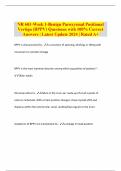
-
NR 603-Week 1-Benign Paroxysmal Positional Vertigo (BPPV) Questions with 100% Correct Answers | Latest Update 2024 | Rated A+
- Tentamen (uitwerkingen) • 4 pagina's • 2024
- Ook in voordeelbundel
-
 DEEPSEEK
DEEPSEEK
-
- $13.48
- + meer info
NR 603-Week 1-Benign Paroxysmal Positional Vertigo (BPPV) Questions with 100% Correct Answers | Latest Update 2024 | Rated A+
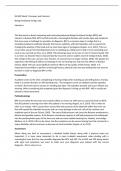
-
NR 603 Week 1 Compare and Contrast Assignment: Benign Paroxysmal Positional Vertigo and Meniere’s Disease
- Overig • 3 pagina's • 2024
-
 Oldspice
Oldspice
-
- $19.49
- + meer info
This discussion is about comparing and contrasting between Benign Positional Vertigo (BPV) and Meniere’s disease (MD). BPV and MD are both a neurological disorder with similar signs and symptoms that may cause a challenge for providers to diagnosis. BPV is a common type of vertigo that is a treatable peripheral vestibular disorder that occurs suddenly, with brief episodes and is caused from changing the position of the head and my even have signs of nystagmus (Argaet, et al, 2019). This ca...
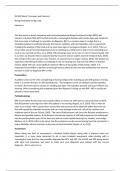
-
NR 603 Week 1 Compare and Contrast Assignment: Benign Paroxysmal Positional Vertigo and Meniere’s Disease
- Overig • 3 pagina's • 2024
-
 Oldspice
Oldspice
-
- $18.49
- + meer info
This discussion is about comparing and contrasting between Benign Positional Vertigo (BPV) and Meniere’s disease (MD). BPV and MD are both a neurological disorder with similar signs and symptoms that may cause a challenge for providers to diagnosis. BPV is a common type of vertigo that is a treatable peripheral vestibular disorder that occurs suddenly, with brief episodes and is caused from changing the position of the head and my even have signs of nystagmus (Argaet, et al, 2019). This ca...
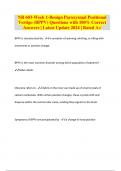
-
NR 603-Week 1-Benign Paroxysmal Positional Vertigo (BPPV) Questions with 100% Correct Answers | Latest Update 2024 | Rated A+
- Tentamen (uitwerkingen) • 4 pagina's • 2024
-
Ook in voordeelbundel
-
 Parie
Parie
-
- $9.49
- + meer info
NR 603-Week 1-Benign Paroxysmal Positional Vertigo (BPPV) Questions with 100% Correct Answers | Latest Update 2024 | Rated A+ BPPV is characterized by - a sensation of spinning, whirling, or tilting with movement or position change BPPV is the most common disorder among which population of patients? - Older adults Otoconia refers to - debris in the inner ear made up of small crystals of calcium carbonate. With certain position changes, these crystals shift and disperse within the semicircular...
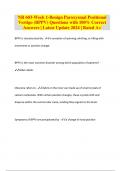
-
NR 603-Week 1-Benign Paroxysmal Positional Vertigo (BPPV) Questions with 100% Correct Answers | Latest Update 2024 | Rated A+
- Tentamen (uitwerkingen) • 4 pagina's • 2024
- Ook in voordeelbundel
-
 VasilyKichigin
VasilyKichigin
-
- $12.48
- + meer info
NR 603-Week 1-Benign Paroxysmal Positional Vertigo (BPPV) Questions with 100% Correct Answers | Latest Update 2024 | Rated A+
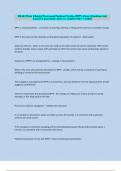
-
NR 603 Week 1-Benign Paroxysmal Positional Vertigo (BPPV) Exam | Questions And Answers Latest {2024- 2025} A+ Graded | 100% Verified
- Tentamen (uitwerkingen) • 2 pagina's • 2024
- Ook in voordeelbundel
-
 DEEPSEEK
DEEPSEEK
-
- $13.48
- + meer info
NR 603 Week 1-Benign Paroxysmal Positional Vertigo (BPPV) Exam | Questions And Answers Latest {} A+ Graded | 100% Verified
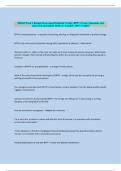
-
NR 603 Week 1-Benign Paroxysmal Positional Vertigo (BPPV) Exam | Questions And Answers
- Tentamen (uitwerkingen) • 2 pagina's • 2025
- Ook in voordeelbundel
-
 TheeGrades
TheeGrades
-
- $7.99
- + meer info
NR 603 Week 1-Benign Paroxysmal Positional Vertigo (BPPV) Exam | Questions And Answers

-
NR 603-Week 1-Benign Paroxysmal Positional Vertigo (BPPV) Exam Practice Questions and Answers 100% Pass
- Tentamen (uitwerkingen) • 4 pagina's • 2024
-
 SophiaBennett
SophiaBennett
-
- $9.99
- + meer info
NR 603-Week 1-Benign Paroxysmal Positional Vertigo (BPPV) Exam Practice Questions and Answers 100% Pass BPPV is characterized by - Answer️️ -a sensation of spinning, whirling, or tilting with movement or position change BPPV is the most common disorder among which population of patients? - Answer️️ - Older adults Otoconia refers to - Answer️️ -debris in the inner ear made up of small crystals of calcium carbonate. With certain position changes, these crystals shift and dis...
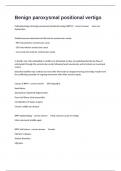
-
Benign paroxysmal positional vertigo Certification Review Exam Questions And Answers Verified Solutions.
- Tentamen (uitwerkingen) • 5 pagina's • 2024
-
Ook in voordeelbundel
-
 Rechga
Rechga
-
- $12.99
- + meer info
Pathophysiology of benign paroxysmal positional vertigo (BPPV)? - correct answer Inner ear dysfunction. Otoliths become detached and fall into the semicircular canals: - 90% into posterior semicircular canal - 10% into inferior semicircular canal - very rarely into anterior semicircular canals In health, hair cells embedded in otoliths are stimulated as they are pulled/pushed by the flow of endolymph through the semicircular canals following head movements and terminate as movement...

Wist je dat een verkoper gemiddeld €76 per maand verdient met het verkopen van samenvattingen? Hint, hint. Ontdek alles over verdienen op Stuvia


